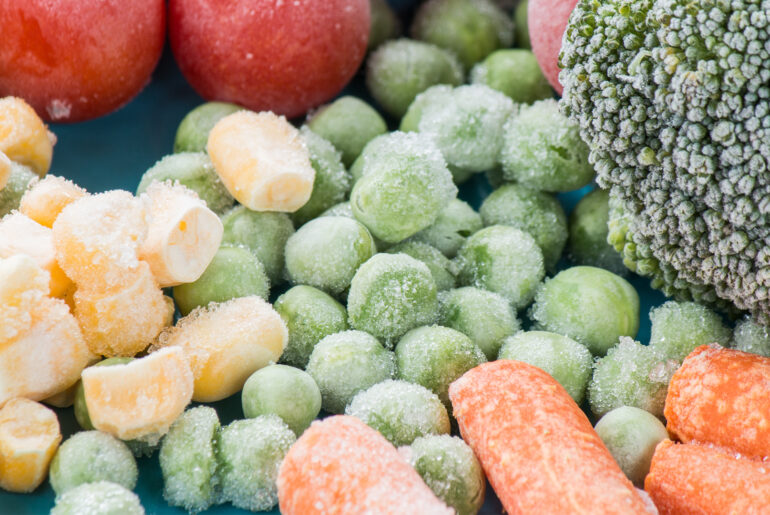The American Frozen Food Institute (AFFI) has welcomed legislation proposed in the US Congress that will help families eat more fruits and vegetables as part of a healthy diet by providing more opportunities to take home frozen produce when they shop. The Supporting All Healthy Options When Purchasing Produce (SHOPP) Act (HR 3127) was jointly introduced on May 9 by Representatives Mark Alford (Republican, Missouri) and Jasmine Crockett (Democrat, Texas).
The Supplemental Nutrition Assistance Program (SNAP) and the Gus Schumacher Nutrition Incentive Program (GusNIP) can close a produce intake gap among lower income households. However, GusNIP, its point-of-sale promotion programs and USDA’s Produce Prescription Program currently only fund projects that support the consumption of so-called fresh produce.
The SHOPP Act would amend and modernize GusNIP’s priorities in several ways. Under the proposal, the Secretary of Agriculture must consider GusNIP program grant applications/projects that promote or incentivize frozen fruit and vegetable consumption among SNAP recipients. Furthermore, USDA must allow frozen fruits, vegetables and legumes to be included in the Prescription Produce Program.
“Americans should be incentivized to live a healthy lifestyle. GusNIP is an easy way to do that. While this program is an opportunity to reward SNAP participants for choosing healthy produce options, I believe it can be improved. Our legislation would do just that,” said Congressman Alford. “The SHOPP Act would amend the GusNIP program to expand those opportunities to frozen fruits and vegetables. Making decisions in the grocery store with the health of one’s family in mind should not be as challenging as it is. We must ensure that whether you’re in rural America or a big city, you have the flexibility to meet your family’s nutritional needs. I’m proud to introduce the SHOPP Act alongside Rep. Crockett.”
“America is the richest country in the history of the world – and yet, there are still millions who live with hunger without regular access to nutritious food, including many in my home of North Texas,” added Representative Crockett. “SNAP is one of our country’s only policy solutions to this problem, but burdensome restrictions make it difficult for hungry families to make full use of this crucial program and access nutritious food within their own neighborhoods.”

She added: “The SHOPP Act removes some of these restrictions by including frozen fruits and veggies as part of GusNIP – a program that rewards recipients who spend $1 on fresh fruits and veggies with an additional $1 to spend on those products. We’ve seen great success from GusNIP, but more needs to be done to ensure this program is accessible in areas with less access to fresh food. For families who live in food deserts like those in Dallas, frozen fruits and veggies are a great alternative to fresh produce – it can last longer and go farther without sacrificing on nutrition. Adding frozen fruits and veggies to the list of prioritized foods for GusNIP and the Produce Prescription Program makes it easier for Americans to make use of this benefit and lowers the bar for entry for more grocery stores to participate.”
Representatives Don Bacon (Republican, Nebraska), Greg Casar (Democrat, Texas), Mary Miller (Republican, Ilinois) and Bennie Thompson (Democrat, Mississippi) are co-sponsors on the legislation. The SHOPP Act, if passed, would take effect on March 6, 2024, which just happens to be National Frozen Food Day in the USA.
“Ninety Percent of SNAP participants don’t eat enough fruits and vegetables, and research shows a lack of time and resources often get in the way of healthy eating,” said AFFI President and CEO Alison Bodor. “The broad inclusion of frozen food in federal government feeding programs can help consumers overcome those barriers and tackle the produce consumption crisis head on. This proposal would enhance USDA’s existing programs and increase access to a variety of healthy food choices for millions of Americans.”
Promoting the inclusion of frozen food is a pragmatic solution for meeting the country’s nutritional needs, she added. The US Dietary Guidelines for Americans states that “all forms of foods, including fresh, canned, dried, frozen and 100% juices in nutrient dense forms, can be included in healthy dietary patterns.”
Studies show that frozen fruits and vegetables are as rich in nutrients, and in some cases more so, than fresh-stored produce because the produce is frozen within hours of harvest. Additional research conducted by AFFI in 2022 found that eight out of 10 SNAP-eligible households surveyed agreed that frozen fruits and vegetables make it easier to eat more produce, prevent food waste and help save money. Frozen produce also serves as an important complement to the fresh market and allows more opportunities for consumers to take advantage of the access to fruits and vegetables.
“Frozen food is a perfect solution for anyone who wants to stretch their food dollars and optimize healthy food purchases at the same time. This legislation is a practical approach to combating food and nutrition security in America. AFFI calls on Congress to move quickly on the SHOPP Act so more Americans can have access to nutrition year-round,” concluded Bodor.






